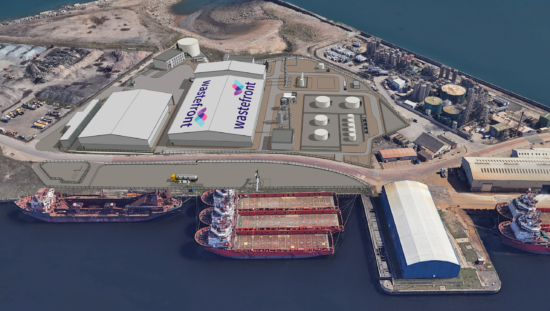Wastefront Life Cycle Assessment upgraded
 An impression of what the Wastefront plant will look like (Photo: Wastefront)
An impression of what the Wastefront plant will look like (Photo: Wastefront)
Wastefront’s updated Life Cycle Assessment (LCA) by independent auditor DNV has found that “the plant’s environmental benefits are now even more pronounced than before”. Top-line environmental improvements include the following.
The increased size of the Port of Sunderland plant and optimisation of configuration will reportedly result in a higher reduction of emissions – approximately 2.7mn metric ton (mt) of CO2 emissions over the plant’s operational lifespan. This equates to approximately 1.07 mt of CO2 per mt of end-of-life-tyres (ELTs). Wastefront’s plant in Sunderland. According to Wastefront, that figure “will serve as a Blueprint for future plants”. And, once operational, Sunderland will handle the safe and environmentally-conscious disposal of 83,000 mt of ELTs per year.
The Carbon Yield quantifies the environmental impact of an investment in terms of emissions avoided per annum, demonstrating how Wastefront’s blueprint will have a major impact on global efforts to cut emissions. The ratio of total investment per plant, for CO2 avoided, is approximately 50$/mt CO2. This low value means that investing in a Wastefront plant is seen as a “highly cost-efficient way to reduce CO2 emissions”.
The approach adopted by Wastefront includes considering counterfactual scenarios (what would happen if the company did not exist). In the UK market, where ELTs are often incinerated or exported abroad, Wastefront’s global plans will have a significant climate impact that reverses an increasingly damaging trend. In 2022, 395,000 mt of ELTs (80 per cent of the total number of ELTs generated) were exported from the UK to overseas destinations, according to Wastefront. ELTs across Europe continue to rise as well as the amount of ELTs in the US that are either landfilled or unaccounted for. “In addition, many applications previously accepted for their positive effect on CO2 emission, such as ELTs crumbs into playgrounds, are being banned by more and more countries for generating harmful contaminants”, a Wastefront statement explained.
Wastefront CEO Vianney Vales commented: “End-of-life tyres are a major source of global CO2 emissions and the problem is only getting worse, with previously accepted solutions being banned because of hazards, beyond emissions. The Wastefront Blueprint tackles this head-on by providing a sustainable solution that chemically recycles ELTs. Investing in Wastefront is a highly cost-effective way to reduce emissions of CO2 and the release of other pollutants, while creating value with our recycled products.”



Comments